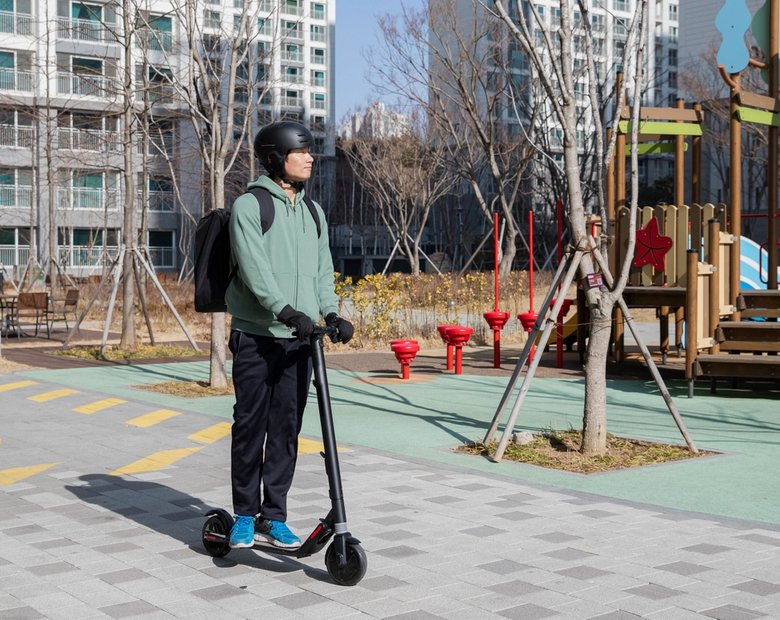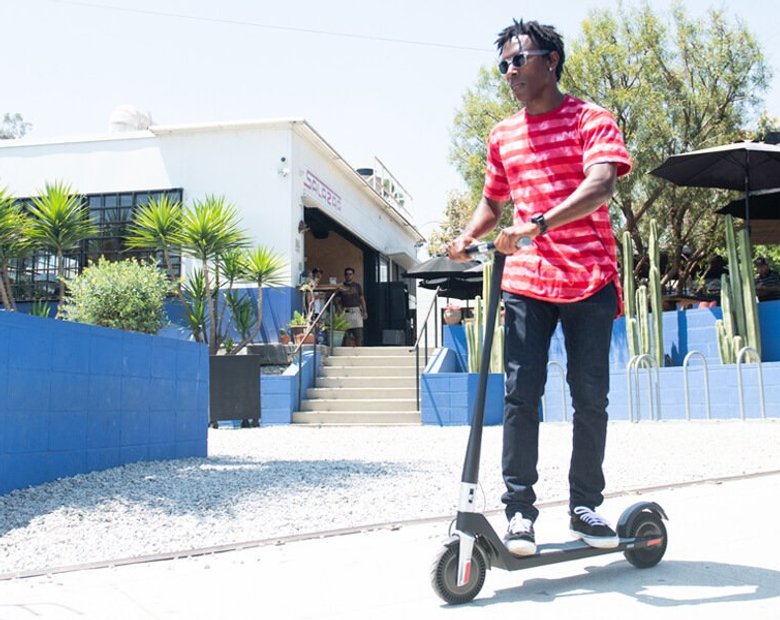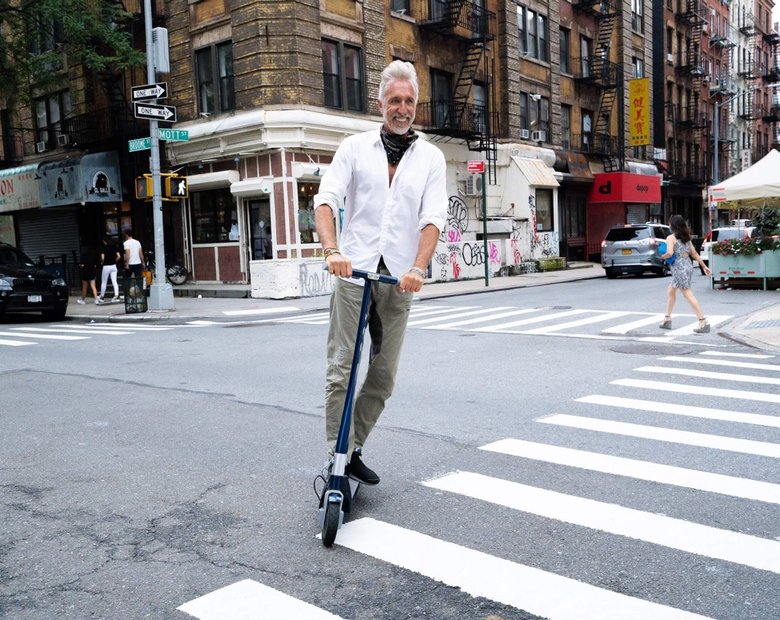"There is no federal law in the US requiring riders to have insurance..."
but what you also need to know...
Some states DO have laws that require riders to have insurance
-or-
- Buy an authorised permit
-or-
- Undergo registration
It's important to be aware... that electric scooter laws can vary according to:
- Which State you live
- Power rating of your scooter motor
- Your age
- Speed and where you can actually ride your scooter
If you're considering riding an electric scooter for the daily urban commute - or even just for recreation - this article will give you the lowdown on getting insurance for an electric scooter.

Rise of the electric scooter - and injuries
Mass production of powerful, low-cost lithium-ion battery cells has kickstarted serious interest in using an electric scooter. More people are turning to micromobility* as a low-cost alternative to their personal transport needs.
*Micromobility - small, lightweight vehicles designed for low speeds, such as e-bikes, electric scooters, electric skateboards and electric, pedal-assisted bicycles.
But the electric scooter boom has also seen an escalation in scooter-related injuries. Many recent studies show scooter riders face the same risks as bike riders.
E-scooter related injuries
- 60 per cent of all electric scooter injuries are head injuries. (Source: "Injury Prevention" Journal, 2023).
- 1 in 8 patients admitted to hospital after an e-scooter accident in 2020 - up from 1 in 20 in 2011. (Source: American Academy of Pediatrics (AA)).
- 27,000 e-scooter-related injuries between 2017 and 2019. (Source: The Consumer Product Safety Commission (CPSC))
- 222 per cent increase in electric scooter injuries between 2014 and 2018. (Source: The National Highway Traffic Safety Administration (NHTSA))
Electric scooters are fun, recreational and commuter vehicles, but they're not toys. Riders should be prepared to protect themselves, and those around them.
This means taking all the usual safeguards, including wearing helmets and other protective gear. When out riding you should always follow the US Highway Code, such as signaling stops and turns, and obeying traffic signals.
But the question still is ... do you need insurance for an electric scooter?


What type of vehicle are you actually riding?
It's not a trick question. There are a range of micromobility vehicles on the market. And it can be confusing, as “scooter” may apply to different micromobility vehicles.
Your e scooter does, however, fit into a vehicle category. As you will see below...
Here are some general classifications of scooters:
Kick scooter - generally refers to two, three, or four-wheeled push scooters without seats.
These are commonly associated with toys for kids. Kick scooters may be non-motorized or equipped with gas or electric-powered motors.
Motorized scooter - also called a stand-up scooter or electric kick scooter.
The term applies to a vehicle without a seat and, typically, a top speed of 30 mph. Unagi, and other personal electric scooters, are generally classified as “motorized scooters” or “motorized kick scooters.”
Moped - a small, two-wheeled motorized vehicle.
Similar to a motorcycle but has an engine capacity of less than 49cc, and a top speed of less than 30 mph (48 km/h).
Motor scooter - motor scooters are similar to mopeds with an engine capacity of over 49cc.
Some of these vehicles are required to be registered and insured, others are not. In the US, riders of electric motorized scooters, like the Unagi Model One, do not need insurance.
Official definition of an electric scooter
The National Highway Traffic Safety Administration (NHTSA) also re-states the definition of a motorized scooter.
It says ”scooters lacking seats operated in a stand-up mode” are not regulated under federal law as motor vehicles.
In 2023, the NHTSA repeated that electric scooters are considered "low-speed vehicles", and therefore, not subject to the same safety standards as cars or motorcycles.
However, the NHTSA does recommend that electric scooter riders take out insurance, as it can "help to protect financially in the event of an accident".
The NHTSA statement also means individual states and cities are left to set their own rules for using an electric scooter.
Rules about scooter insurance for individual US states
Without a US-wide federal ruling, you will need to check out your legal obligations over scooter insurance at your State (or local city/ area) transportation department.
Electric scooter laws will vary from state to state, based upon one or more of the following:
Speed capability - some states may only require you take out insurance for scooters capable of traveling at certain high speeds.
Budget scooters - while there's no law requiring budget electric scooters to have insurance, some insurance companies may offer policies specifically to cover budget electric scooters.
Subscription scooters - a company's insurance policy may also cover you for taking out a subscription to ride an electric scooter, as with Unagi Scooters. However, it's important to read the terms and conditions of the policy carefully, and ensure you are covered in the event of an accident.
Your age - a number of states require riders to be at least 16 years old to ride an electric scooter.
Where you can ride your scooter - some states, counties or individual cities may allow electric scooters to be ridden on sidewalks. However, others may only allow you to ride in bike lanes or on the streets.

Do I really need to insure my electric scooter?
To answer the question, it's important to know...
- Automobile insurance generally doesn’t cover vehicles with less than four wheels.
- Homeowner insurance may cover an accident on a pedal bicycle, but does not cover motorized bike or scooter trips.
Up until now, very few states actually required you to have insurance for riding an electric scooter but the rules are ongoing in many states. And new laws are now being seriously considered in many more states than previously.
Let's check out latest requirements ...
Insurance rules, state to state
FOUR states only appear to have officially published their rules regarding the requirement for liability insurance before you can ride an electric scooter.
California - for e scooters capable of exceeding 15 mph. Speed limits also vary from state to state - Illinois and Texas (20 mph).
Illinois - originally only if you're aged under 18. However, in 2021, Illinois updgraded their law, which now requires ALL electric scooter riders to have liability insurance. The minimum coverage is $25,000 for bodily injury and $50,000 for property damage.
Texas - since 2022, Texas requires liability insurance for e scooter motors rated at 750 watts and above.
Washington, D.C - in 2022, Washington, D.C. passed a law requiring ALL electric scooter riders to have liability insurance. The minimum coverage is $50,000 for bodily injury and $100,000 for property damage.
LAW CHANGES COMING SOON?
THREE more states are also considering introducing a law for ALL electric scooter riders to have liability insurance:
California - minimum coverage: $15,000 (bodily injury) and $30,000 (property damage).
New York - minimum coverage: $25,000 (bodily injury) and $50,000 (property damage).
Florida - for e scooter motors rated at 750 watts and above. Minimum coverage is $10,000 (bodily injury) and $20,000 (property damage).
Permit or registration only by age
FIVE states require you to only have a permit or to register, according to your age.
Oregon - under the age of 18
Colorado, Maryland, North Carolina - under the age of 16.
Hawaii - under the age of 15.
Clearly, the law regarding insurance needed for riding electric scooters looks likely to be rolled out in more states in the years or even months ahead.
Let's get to grips with what e scooter insurance means for you.

How does scooter insurance work?
It has always be strongly advised for e scooter riders to take out insurance for an electric scooter to cover any large medical expenses.
The recommended minimum is Comprehensive insurance, which includes:
- Liability coverage
-and-
- Collision coverage
It means you can be covered for a variety of accidents and injuries.
What injuries can insurance cover?
Not all large insurance companies offer specific e-scooter insurance. However, there is a chance that a motorcycle insurance or bike insurance plan could also cover you for an electric scooter.
Typically, this would include:
Personal Injuries
Personal injury protection to cover electric scooters for injuries that you could suffer as a rider, and some or all of the potential medical expenses.
Injuries to others
You could be covered if you have injured someone else in an accident involving an electric scooter.
Damages to the scooter
Scooter insurance will generally cover accidents where damages have occurred to any part of your scooter, such as the frame and handlebars, motor or kickboard.
Theft of a scooter
Your insurance company could cover you for the theft of an electric scooter. However, the cover may be limited to specific circumstances only. You need to read the small print carefully.
Property damage
If your accident involves other people's property, then your insurance could potentially cover you for this too.

"How do I get scooter insurance?"
Until recently, getting insurance for riding an electric scooter was not easy.
If a rider was found at fault for an accident, they were responsible for damages to themselves and the other party.
Most insurance companies had not developed specific policies to cover motorized electric scooters. Some companies explicitly state their auto insurance will not cover scooter accidents.
One exception was Nationwide, who continue to offer scooter insurance
The situation is improving. More major insurance companies are starting to cover riders of privately-owned scooters through an "umbrella policy".
What is an "umbrella policy?"
An “umbrella policy” covers injuries and damages received outside the home.
This means it will often extend to liability claims for electric scooter accidents.
You might get cover for:
- Medical expenses if others are injured.
-or-
- If damage is caused to another person’s property.
But you will NOT be covered for medical expenses.
Umbrella insurance can be expensive, and may not be the ideal solution for everyone to insure their electric scooter.
USA companies that offer insurance to ride an electric scooter:
- Nationwide
- State Farm
- Geico
- Progressive
- USAA
- Esurance
- Allstate
- Liberty Mutual
- Farmers Insurance
IMPORTANT! These companies may not offer insurance in all states, and the coverage offered mayvary by company. You should check your insurance company first to see if they offer electric scooter insurance, and what kind of coverage is available.
US companies that offer liability insurance* that may cover riding an electric scooter:
- Velosurance
- Metromile
- RideShare Insure
- Turo
- SherpaShare
*Liability insurance - covers damage you cause to others in an accident. Some may also offer comprehensive coverage for both collisions and damage to your own scooter.
All-vehicle insurance approach
Increasingly, more insurance companies offer an all-vehicle approach to cater for the rising popularity for riding electric scooters, including:
- Vroom
- Zego
- Laka
- Bikma
FINALLY: Always check the small print in any insurance policy documents, or seek professional advice, before proceeding. To ensure your electric scooter is covered, as per the law in your particular state, county or city.

FAQS
Does regular insurance cover electric scooters?
Generally speaking, no. It is rare for an electric scooter to be covered by regular insurance. You need to check the policies available.
Does medical insurance cover bodily injury expenses from electric scooter accidents?
"I get into an accident involving an electric scooter... am I covered for my medical bills for bodily injury?"
In some cases, medical expenses can be covered by your e-scooter insurance, depending on the circumstances. Medical expenses for others who have been injured in the accident would not be covered.
Am I automatically insured with a rideshare company?
Rideshare companies are insured against liabilities if a rider gets into an accident on one of their vehicles. But the rider is not usually covered.
This means you would be personally responsible for medical expenses or damages to another vehicle, as well as for your own injuries and damages if found at fault.
Health insurance should cover a rider’s injuries but will not cover the other party.
Most rideshare companies have Terms of Use that state: the company cannot be held liable for damages or injuries sustained while on the scooter. This leaves riders of shared scooters liable for all damages in an accident.
FINAL WORD: To ensure your electric scooter is covered, as per the law in your particular state, county or city - always check the small print in any insurance policy documents, or seek professional advice, before proceeding to take out a particular insurance policy.












